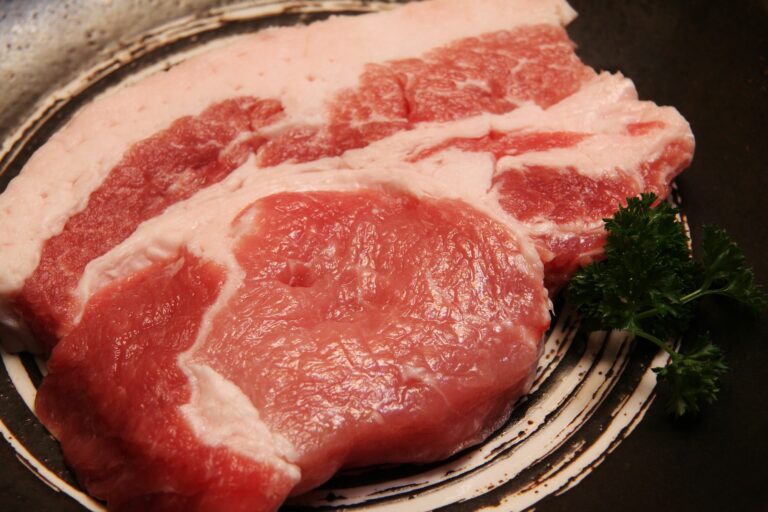Pork is one of the most widely consumed meats worldwide and is known for its versatility and delicious taste. However, there are often debates surrounding the nutritional value and health effects of consuming pork. In this comprehensive guide, we will delve into the nutrition facts of pork and explore its potential health benefits and considerations.
Nutrition Facts of Pork:
Macronutrients:
Pork is a rich source of high-quality protein, which is essential for various bodily functions, including muscle growth and repair. A 3-ounce serving of pork tenderloin contains approximately 22 grams of protein. Additionally, pork is a significant source of dietary fat, with variations depending on the cut. For instance, a 3-ounce serving of pork shoulder contains around 22 grams of fat, whereas the same portion of pork tenderloin has only about 6 grams of fat.
Vitamins and Minerals:
Pork is a good source of several essential vitamins and minerals. It contains B-vitamins such as thiamin, niacin, riboflavin, vitamin B6, and vitamin B12, which play crucial roles in energy production, brain function, and the formation of red blood cells. Pork also provides essential minerals like iron, zinc, and selenium. Iron is necessary for oxygen transport, while zinc and selenium contribute to immune function and antioxidant defense.
Cholesterol Content:
One aspect of pork that often raises concerns is its cholesterol content. Pork tends to have a higher cholesterol content compared to some other meats. However, it’s important to note that cholesterol in food does not necessarily translate directly to higher cholesterol levels in the blood for most individuals. The body’s cholesterol levels are influenced by various factors, including genetics, overall diet, and lifestyle. If you have specific concerns about cholesterol, it’s advisable to consult a healthcare professional.
Health Effects of Pork:
Protein Source:
Pork can serve as an excellent protein source, especially for individuals following high-protein diets or those looking to support muscle growth and repair. The amino acids present in pork protein are necessary for the synthesis of new muscle tissue and can aid in post-workout recovery.
Nutrient Density:
Pork contains a variety of essential nutrients, including vitamins, minerals, and amino acids. Incorporating pork into a well-balanced diet can help ensure an adequate intake of these nutrients, contributing to overall health and well-being.
Iron Absorption:
Pork is a rich source of heme iron, which is more easily absorbed by the body compared to non-heme iron found in plant-based foods. Adequate iron intake is crucial for preventing iron deficiency anemia and maintaining optimal oxygen transport within the body.
Considerations for Fatty Cuts:
While lean cuts of pork, such as tenderloin, can be a part of a healthy diet, fatty cuts like bacon and sausage should be consumed in moderation. These cuts are typically higher in saturated fat and calories, which, when consumed in excess, may contribute to weight gain and an increased risk of heart disease. It’s advisable to choose leaner cuts and trim any visible fat to minimize the intake of saturated fat.
Cooking Methods:
The health impact of pork can also be influenced by the cooking methods used. Grilling, baking, or roasting pork is generally considered healthier than frying, as it reduces the overall fat content. Additionally, using marinades or rubs with herbs and spices instead of heavy sauces can enhance flavor without adding excessive calories or sodium.
Individual Factors:
It’s important to remember that the health effects of pork can vary depending on individual factors such as overall diet, lifestyle, and underlying health conditions. If you have specific dietary requirements or health concerns, it’s recommended to consult with a registered dietitian or healthcare professional who can provide personalized guidance.
In conclusion, pork can be a nutritious part of a well-balanced diet, providing essential nutrients like protein, vitamins, and minerals. Lean cuts of pork, when prepared using healthy cooking methods, can offer health benefits such as supporting muscle growth, providing heme iron for improved absorption, and contributing to overall nutrient density. However, it’s important to be mindful of portion sizes and opt for lean cuts to minimize saturated fat intake. As with any dietary choice, moderation and individual considerations are key to maintaining a healthy and balanced approach to pork consumption.
- Comprehensive Review Unveiling the Top CBD Products By The Trusted Lab - April 17, 2024
- Vape Pen Kits By Vapesourcing-Comprehensive Review Top Vape Pen Kits for an Exceptional Vaping Experience - March 26, 2024
- Kratom Powder By Just Kratom-Exploring the Spectrum: A Joyful Journey Through Just Kratom’s Powder Varieties - March 26, 2024

